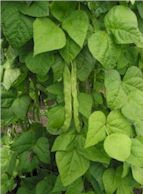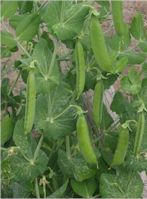|

Kidney Bean |
Typical of leguminous plants (so called because they furnish legumin, or vegetable cheese), whilst furthermore possessing certain medicinal properties, the Bean and the Pea have a claim to be classed with Herbal Simples.
The common Kidney Bean (Phaseolus vulgaris) is a native of the Indies, but widely cultivated all over Europe, and so well known as not to need any detailed description as a plant. Because of the seed's close resemblance to the kidney, as well as to the male testis, the Egyptians made it an object of sacred worship, and would not partake of it as food. They feared lest by so doing they should eat what was human remaining after death in the Bean, or should
consume a soul. The Romans celebrated feasts (Lemuria) in honour of their departed, when Beans were |
cast into the fire on the altar; and the people threw black Beans on the graves of the deceased, because the smell was thought disagreeable to any hostile Manes. In Italy at the present day it is customary to eat Beans, and to distribute them among the poor, on the anniversary of a death. Because of its decided tendency to cause sleepiness the Jewish High Priest was forbidden to partake of Beans on the day of Atonement; and there is now a common saying in Leicestershire that
for bad dreams, or to be driven crazy, one has only to sleep all night in a Bean field. The philosopher, Pythagoras, warned his pupils against eating Beans, the black spot thereon being typical of death; and the disciples were ever mindful: "Jurare in verba magistri." When bruised and boiled with garlic, Beans have been known to cure coughs which were past other remedies. But the roots of the Kidney Bean have proved themselves dangerously narcotic.
|

Pea |
The Pea (Pisum sativum) is a native of England, first taking its botanical name from Pisa, a town of Elis, where Peas grew in plenty. The English appellation was formerly Peason, or Pease, and the plant has been cultivated in this country from time immemorial; though not commonly, even in Elizabeth's day, when (as Fuller informs us) "Peas were brought from Holland, and were fit dainties for ladies, they
came so far, and cost so dear." In Germany Peas are thought good for many complaints, especially for wounds and bruises; children affected with measles are washed there systematically with water in which peas have been boiled. These, together with Beans and lentils, etc., are included under the general name of pulse, about which Cowper wrote thus:
|
"Daniel ate pulse by choice: example rare! Heaven blest the youth, and made him fresh and fair."
Grey Peas were provided in the pits of the Greek and Roman theatres, as we supply oranges and a bill of the Play.
"Hot Grey Pease and a suck of bacon" (tied to a string of which the stall-keeper held the other end), was a popular street cry in the London of James the First.
Peas and Beans contain sulphur, and are richer in mineral salts, such as potash and lime, than wheat, barley, or oats; but their constituents are apt to provoke indigestion, whilst engendering flatulence through sulphuretted hydrogen. They best suit persons who take plenty of out-door exercise, but not those of sedentary habits. The skins of parched Peas remain undigested when eaten cooked, and are found in the excrements. These leguminous plants are less easily assimilated
than light animal food by persons who are not robust, or laboriously employed, though vegetarians assert to the contrary. Lord Tennyson wrote to such effect as the result of his personal experience (in his dedication of "Tiresias" to E. Fitzgerald):
"Who live on meal, and milk, and grass:
And once for ten long weeks
I tried Your table of Pythagoras,
And seem'd at first 'a thing enskied' (As Shakespeare has it)--airylight,
To float above the ways of men:
Then fell from that half spiritual height,
Until I tasted flesh again.
One night when earth was winter black,
And all the heavens were flashed in frost,
And on me--half asleep--came back
That wholesome heat the blood had lost."
But none the less does a simple diet foster spirituality of mind. "In milk"--says one of the oldest Vedas--"the finer part of the curds, when shaken, rises and becomes butter. Just so, my child, the finer part of food rises when it is eaten, and becomes mind."
Old Fuller relates "In a general dearth all over England (1555), plenty of Pease did grow on the seashore, near Dunwich (Suffolk), never set or sown by human industry; which being gathered in full ripeness much abated the high prices in the markets, and preserved many hungry families from famishing." "They do not grow", says he, "among the bare stones, neither did they owe their original to shipwrecks, or Pease cast out of ships." The Sea-side Pea (pisum maritimum) is
a rare plant.
Herb Simples
The Primitive Simplers presented here show the way of life in other generations, it is not suggested or recommended trying them yourself. |
|
Garden
Herbs
Home
History of Herbs
Herb Gardening
Herbs for Beginners
Drying & Preserving Herbs
Indoor Herb Gardening
Herb Garden
Hints & Tips
Herbal
Cooking
Herb Chart
Using Herbs
Culinary Herbs
Herb
Oil and Vinegar
Herb Teas
Herb Candy
Herb Jelly
Herb Simples
Preface
Introduction
Alphabetical Listing

Trade
Recipes Online
Share your Recipes with others!!
|



